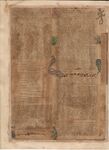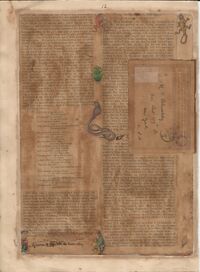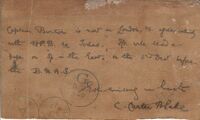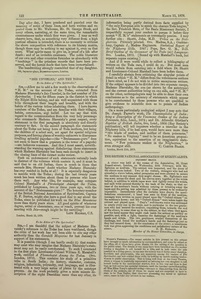Difference between revisions of "HPB-SB-7-12"
m |
|||
| Line 10: | Line 10: | ||
{{Style P-No indent|save my own unhappiness. My daughter was practising at the piano, and though I was at first too occupied by my own reflections to notice what she was doing, yet the noise at last began to jar on my nerves, and I asked her to give up practising, and try to let us have a ''seance ''quite to ourselves. With evident and unmistakable reluctance she drew a chair towards the table by my side; and glad to have secured her compliance on any terms, I rose hastily, and placed before her a piece of paper and a pencil, taken from a side table in the same room. To the best of my recollection, not one word passed with reference to the reflections that had been occupying my mind for the previous hour or two. Almost instantly that she took up the pencil, a sofa was sketched out on the paper before her. She has never either learnt drawing or shown any desire to draw. “What can that mean?” I thought. “Are we to look on the sofa for anything?” was my inquiry. There were three loud raps, which signified to me a reply in the affirmative. My daughter rose and went towards the sofa. She moved it from the wall, she took up the cushions and antimacassars, and examined carefully the seat and the ground below, but all was as usual, and we both thought “Peter” was playing us some trick. Miss Showers said as much, as she returned to her seat, the raps accompanying her all the time, and becoming louder and more imperative as she sat down. Upon this I rose, and walked to the sofa, which was hardly four feet from where I was sitting. I looked at it carefully, and even raised it to examine the seat underneath. In vain—nothing was to be seen there, and I was giving up the search when it occurred to me, why or wherefore I cannot say, to put my hand down in the narrow space between the back and the seat. To my astonishment, my fingers touched some paper, and I drew out a crumpled sheet of foolscap, on which were the following lines:—}} | {{Style P-No indent|save my own unhappiness. My daughter was practising at the piano, and though I was at first too occupied by my own reflections to notice what she was doing, yet the noise at last began to jar on my nerves, and I asked her to give up practising, and try to let us have a ''seance ''quite to ourselves. With evident and unmistakable reluctance she drew a chair towards the table by my side; and glad to have secured her compliance on any terms, I rose hastily, and placed before her a piece of paper and a pencil, taken from a side table in the same room. To the best of my recollection, not one word passed with reference to the reflections that had been occupying my mind for the previous hour or two. Almost instantly that she took up the pencil, a sofa was sketched out on the paper before her. She has never either learnt drawing or shown any desire to draw. “What can that mean?” I thought. “Are we to look on the sofa for anything?” was my inquiry. There were three loud raps, which signified to me a reply in the affirmative. My daughter rose and went towards the sofa. She moved it from the wall, she took up the cushions and antimacassars, and examined carefully the seat and the ground below, but all was as usual, and we both thought “Peter” was playing us some trick. Miss Showers said as much, as she returned to her seat, the raps accompanying her all the time, and becoming louder and more imperative as she sat down. Upon this I rose, and walked to the sofa, which was hardly four feet from where I was sitting. I looked at it carefully, and even raised it to examine the seat underneath. In vain—nothing was to be seen there, and I was giving up the search when it occurred to me, why or wherefore I cannot say, to put my hand down in the narrow space between the back and the seat. To my astonishment, my fingers touched some paper, and I drew out a crumpled sheet of foolscap, on which were the following lines:—}} | ||
| − | {{Style P-Poem|poem= Our realm is one of purity, | + | {{Style P-Poem|poem=Our realm is one of purity, |
| − | + | :::’Tis spirit land; | |
| − | ’Tis spirit land; | ||
| − | |||
No woe and no obscurity | No woe and no obscurity | ||
| − | + | :::In our fair band. | |
| − | In our fair band. | ||
| − | |||
’Twill last into futurity, | ’Twill last into futurity, | ||
| − | + | :::Aye, ever stand; | |
| − | Aye, ever stand; | ||
| − | |||
Come, friend, and have thy name enrolled, | Come, friend, and have thy name enrolled, | ||
| − | + | :::For spirit land. | |
| − | For spirit land. | ||
May be thou’lt find thy cross here | May be thou’lt find thy cross here | ||
| − | + | :::Hard to carry; | |
| − | Hard to carry; | ||
| − | |||
But onward, ever onward, | But onward, ever onward, | ||
| − | + | :::Do not tarry. | |
| − | Do not tarry. | ||
| − | |||
For One alone will bless | For One alone will bless | ||
| − | + | :::And help the humble, | |
| − | And help the humble, | ||
| − | |||
And guide the weary footsteps | And guide the weary footsteps | ||
| − | + | :::Lest they stumble. | |
| − | Lest they stumble. | ||
| − | |||
And then, when death arrives | And then, when death arrives | ||
| − | + | :::To call thee home, | |
| − | To call thee home, | ||
| − | |||
Though closed within the precincts | Though closed within the precincts | ||
| − | + | :::Of the tomb, | |
| − | Of the tomb, | ||
| − | |||
A light will break with radiance | A light will break with radiance | ||
| − | + | :::Through the gloom, | |
| − | Through the gloom, | ||
| − | |||
’Twill be thy Lord | ’Twill be thy Lord | ||
| − | + | :::To wake thee from thy swoon. | |
| − | To wake thee from thy swoon. | ||
Now courage, courage, friend. | Now courage, courage, friend. | ||
| − | + | :::Yet still a little longer | |
| − | Yet still a little longer | ||
| − | |||
Put faith in Him, | Put faith in Him, | ||
| − | + | :::And He will make thee stronger. | |
| − | And He will make thee stronger. | ||
| − | |||
But wickedness feeds | But wickedness feeds | ||
| − | + | :::On its own heart’s core, | |
| − | On its own heart’s core, | ||
| − | |||
''Consumes the soul,'' | ''Consumes the soul,'' | ||
| + | :::''And then it is no more.''}} | ||
| − | + | Day after day, I have pondered and puzzled over the meaning- of some of these lines, and have written and repeated them to Mr. Walhouse, Mr., St. George Stock, and many others, narrating, at the same time, the remarkable circumstances under which they were given. I may as well observe here, that, as something very different from a high poetical effusion is intended, there is no necessity to criticize the above composition with reference to its literary merits, though there may be nothing to say against it, even on that score. What spirits mean to give us, is proof of a life after death: and of an invisible existence. The noble literature of our own and other countries furnishes us abundantly with “teachings” in the priceless records that have been preserved, and the heroic deeds that have been immortalised. The {{Style S-HPB SB. HPB underlined|handwriting strongly resembled that of my daughter}}{{Footnote mark|*|}}. | |
| − | + | <small>103, Seymour-place, Bryanston-square, London.</small> | |
| − | |||
| − | 103, Seymour-place, Bryanston-square, London. | ||
| − | |||
| − | |||
| + | {{Footnotes start}} | ||
| + | {{Footnote return|*}}{{Style S-HPB SB. HPB note|... of course <u>it {{Style S-Lost|does}}</u>, and we know why.}} | ||
| + | {{Footnotes end}} | ||
{| style="margin: 0 auto;" | {| style="margin: 0 auto;" | ||
| Line 197: | Line 169: | ||
{{Style P-Signature in capitals|Late Madras, C.S.}} | {{Style P-Signature in capitals|Late Madras, C.S.}} | ||
| − | + | London, March 12,1878. | |
{{Style S-HPB SB. HPB note|See the affixed postal card received six months later.|center}} | {{Style S-HPB SB. HPB note|See the affixed postal card received six months later.|center}} | ||
| Line 308: | Line 280: | ||
}} | }} | ||
| − | ... | + | {{Style S-HPB SB. Editors note|Front:}} |
| + | <center><big>FOREIGN POST CARD</big></center> | ||
| + | <center>FOR COUNTRIES INCLUDED IN THE POSTAL UNION</center> | ||
| + | <center><small>THE ADDRESS ONLY TO BE WRITTEN ON THIS SIDE</small></center> | ||
| + | |||
| + | {{Vertical space|}} | ||
| + | |||
| + | <center>H. P. Blavatsky</center> | ||
| + | <center>302 West 47<sup>th</sup> St.</center> | ||
| + | <center>New York.</center> | ||
| + | <center>U.S.A.</center> | ||
| + | |||
| + | {{Vertical space|}} | ||
| + | |||
| + | {{Style S-HPB SB. Editors note|Back:}} | ||
| + | |||
| + | Captain {{Style S-Lost|Burtoin}} is now in London, & agrees {{Style S-Lost|literally}} with H.P.B. {{Style S-Lost|}} Todas. He will read a paper on “Sp.<ref>Spiritualism.</ref> in the East.” on the 2<sup>nd</sup> Dec. before the B.N.A.S. | ||
| + | |||
| + | {{Style S-Lost|}} | ||
| + | {{Style P-Signature|C. Carter Blake}} | ||
{{HPB-SB-footer-footnotes}} | {{HPB-SB-footer-footnotes}} | ||
Latest revision as of 13:37, 19 June 2024
< Is Man's Immortality Conditional? (continued from page 7-11) >
save my own unhappiness. My daughter was practising at the piano, and though I was at first too occupied by my own reflections to notice what she was doing, yet the noise at last began to jar on my nerves, and I asked her to give up practising, and try to let us have a seance quite to ourselves. With evident and unmistakable reluctance she drew a chair towards the table by my side; and glad to have secured her compliance on any terms, I rose hastily, and placed before her a piece of paper and a pencil, taken from a side table in the same room. To the best of my recollection, not one word passed with reference to the reflections that had been occupying my mind for the previous hour or two. Almost instantly that she took up the pencil, a sofa was sketched out on the paper before her. She has never either learnt drawing or shown any desire to draw. “What can that mean?” I thought. “Are we to look on the sofa for anything?” was my inquiry. There were three loud raps, which signified to me a reply in the affirmative. My daughter rose and went towards the sofa. She moved it from the wall, she took up the cushions and antimacassars, and examined carefully the seat and the ground below, but all was as usual, and we both thought “Peter” was playing us some trick. Miss Showers said as much, as she returned to her seat, the raps accompanying her all the time, and becoming louder and more imperative as she sat down. Upon this I rose, and walked to the sofa, which was hardly four feet from where I was sitting. I looked at it carefully, and even raised it to examine the seat underneath. In vain—nothing was to be seen there, and I was giving up the search when it occurred to me, why or wherefore I cannot say, to put my hand down in the narrow space between the back and the seat. To my astonishment, my fingers touched some paper, and I drew out a crumpled sheet of foolscap, on which were the following lines:—
Our realm is one of purity, |
Day after day, I have pondered and puzzled over the meaning- of some of these lines, and have written and repeated them to Mr. Walhouse, Mr., St. George Stock, and many others, narrating, at the same time, the remarkable circumstances under which they were given. I may as well observe here, that, as something very different from a high poetical effusion is intended, there is no necessity to criticize the above composition with reference to its literary merits, though there may be nothing to say against it, even on that score. What spirits mean to give us, is proof of a life after death: and of an invisible existence. The noble literature of our own and other countries furnishes us abundantly with “teachings” in the priceless records that have been preserved, and the heroic deeds that have been immortalised. The handwriting strongly resembled that of my daughter*.
103, Seymour-place, Bryanston-square, London.
*... of course it does, and we know why.
Isis Unvelled and the Todas
Sir,—Allow me to add a few words to the observations of “H. M.” on the account of the Todas, extracted from Madame Blavatsky’s Isis Unveiled, in the last number of The Spiritualist. I was for fifteen years in the district to which the Nilgiri Hills belong, and am well acquainted with those hills throughout their length and breadth, and with the habits of the various tribes inhabiting them. I have known numbers of the Todas, and am familiar with their villages, habits, ceremonies, and, belief. Let me say that with regard to the communication from the very holy personage who commands Madame Blavatsky’s great respect, every statement in the first paragraph is absolutely and directly contrary to fact. In the second paragraph the statements about the Todas not being born of Toda mothers, but being the children of a select sect, set apart for special religious purposes, and having places of worship unknown to Europeans rivalling splendid pagodas—(the “Brahmanam-guru” does not seem to know that a goparam is the tower of a pagoda)—are ludicrous nonsense. And this I must assert, notwithstanding the warning against disbelieving those statements which Madame Blavatsky has been rash enough to insert in the closing lines of the extract under review.
Such an endorsement of such statements naturally leads to distrust of the volumes which contain it, and it must be said that to an old Indian, there is much in them that seconds Mrs. Showers’ doubt whether Madame Blavatsky has ever resided in India at all! It is especially dangerous to meddle with the Todas; during the last twenty years much has been written about them by persons who knew them well. Any who like, for example, may compare Colonel Marshall’s A Phrenologist Amongst the Todas, published by Longmans, two or three years ago, with the account of the “Brahmanam-guru!” The honorary member of the British National Association of Spiritualists, Captain R. F. Burton, might also have a good deal to say about the Todas, since he published his work on the Blue Mountains more than thirty years since. All good spirits of whatever degree, astral or elementary, νους or ruach, prevent his ever meeting with Isis—rough might be the unveiling!
London, March 12,1878.
<Untitled> (Sir, I am thankful that the subject)
Sir,—I am thankful that the subject of Madame Blavatsky’s reference to the Todas has been ventilated, though the critic of her work has not been able to cite any other authority than the Cornhill Magazine for last January in support of his statements.
It is possible (though I can hardly credit it) that readers may exist who may imagine that Madame Blavatsky’s statement may not be easily corroborated. To such I commend in the first place Lieutenant-Colonel William E. Marshall’s work, entitled A Phrenologist Among the Todas. (8vo. London, 1873). This contains his study of a primitive tribe in South India; its history, character, customs, religion, infanticide, polyandry, and language, and is illustrated with a very large series of plates by the autotype process. As the work probably gives a more minute description of the eight Dravidian races than any other, its information being partly derived from facts supplied by “the only European able to speak the obscure Toda tongue,” the Rev. Friedrich Metz, of the Basle Missionary Society, I respectfully request your readers to peruse it before they accept “H. M.’s” statements as necessarily precise. I may further cite: Shortt, John, M.D. Tribes on the Neilgherries. Privately printed. 8vo. Madras, S.A.; Ouchterlony, Captain J., Madras Engineers. Statistical Report of the Nilgherry Hills. 1847; Pope, Rev. G. M., D.D. Brief Outline of the Grammar of the Tuda (sic) Language: 8vo. London, 1873. [Bound up with Marshall’s book, but separate copies existing.]
And if it were worth while to collect a bibliography of writers on the Toda race, I could do so. But most men would refrain from entering into a field where Dr. Shortt and Lieutenant-Colonel Marshall have been before them.
I carefully abstain from criticising the singular points of detail in which <e H. M.” differs from the voluminous authors I have cited, as I do not wish to notice anonymous writers. If the subject appears to be divided into two separate camps, Madame Blavatsky, the sun (as shown by the autotypes) <... continues on page 7-13 >
Inlay
Foreign Post Card
<Front:>
<Back:>
Captain Burtoin is now in London, & agrees literally with H.P.B. ... Todas. He will read a paper on “Sp.[12] in the East.” on the 2nd Dec. before the B.N.A.S.
...
C. Carter Blake
Editor's notes
- ↑ image by unknown author. four colored pictures and note
- ↑ image by unknown author. colored pictures
- ↑ image by unknown author. colored pictures
- ↑ image by unknown author. colored pictures
- ↑ image by unknown author. colored pictures
- ↑ Isis Unvelled and the Todas by unknown author (signed as Late Madras, C.S.), London Spiritualist, No. 290, March 15, 1878, p. 122
- ↑ Sir, I am thankful that the subject by unknown author, London Spiritualist, No. 290, March 15, 1878, p. 122
- ↑ image by unknown author
- ↑ image by unknown author. colored pictures
- ↑ image by unknown author. colored pictures
- ↑ Foreign Post Card by unknown author. text
- ↑ Spiritualism.









